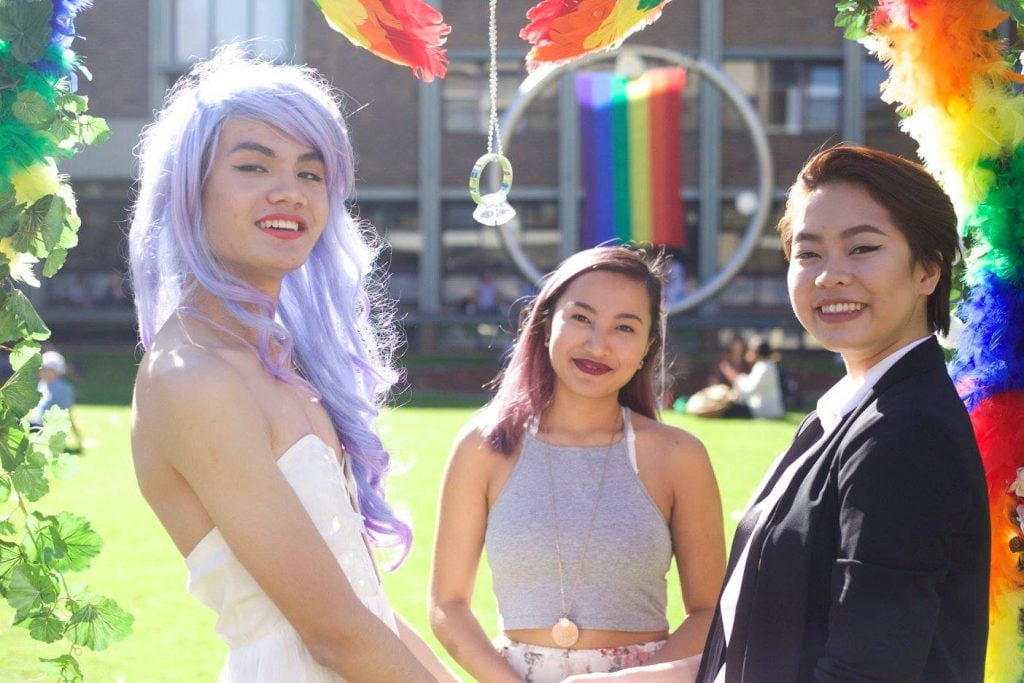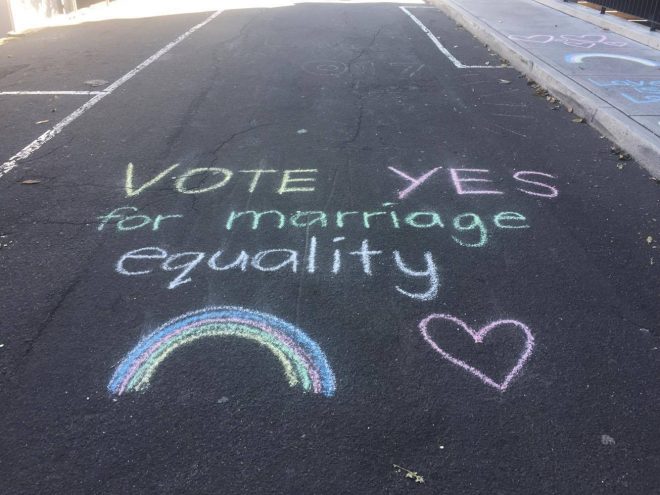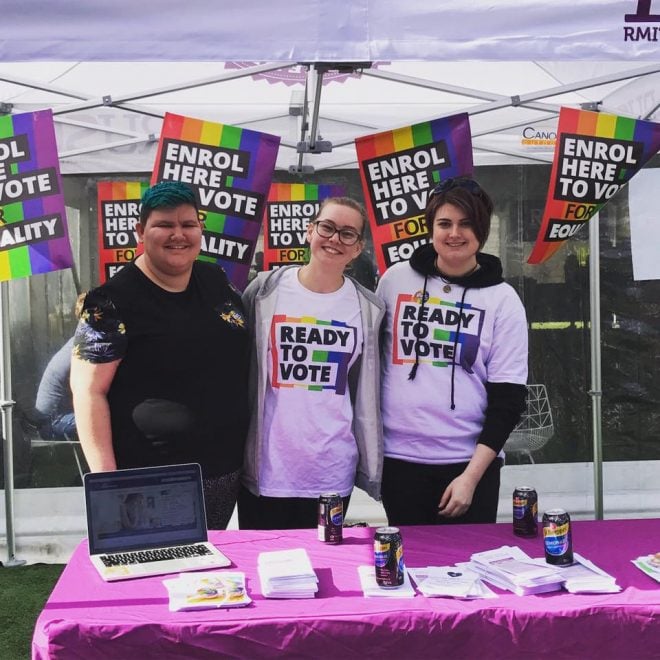How Has The Marriage Equality Campaign Affected Campus Life?
A look at how we're feeling five weeks on from receiving the survey.

It’s been almost five weeks since survey forms on same sex marriage were sent out. As the marriage equality debate continues and 62.5 per cent of postal surveys have been sent back, it’s time to look at where we’re at.
University campuses are microcosms of social and political change, so where better to look than to our students? Are they feeling unsafe? Are they exhausted or more motivated than ever? Are they worried or do they feel positive about the future of LGBTQI+ rights in the country?
Cutting Through The Bubble Of Campus Life
Chris Di Pasquale, the Queer Officer for the National Union of Students, described how campuses came alive around a social issue in a way he’d never seen before, from Monash in Clayton, to Wollongong Uni.
“NUS LGBTI ran stalls around the country both during and after the enrolment period and we had lines of students coming up to update their details, find out about the next rally, ask how they can get involved in the campaign,” he says. “Students have taken placards into their classes to do photo petitions, we’ve had speak outs on almost every campus.”
He told Uni Junkee that almost every student union in Australia has taken a stand in support of marriage equality. “It’s real-world politics and activism cutting through the bubble of campus life,” he says.
Deflated, Disappointed, Apathetic
Milly Muller Reeves, a student at the University of Melbourne, describes the shock she felt when she came onto campus one day and was confronted with anti-queer propaganda plastered on top of Yes campaign posters on buildings.
“I honestly nearly vomited and my partner had to calm me down,” she says. “I skipped the class because I was so distraught.” She described the No campaign as “violent and unforgiving”, sharing that she had friends who avoided going to uni as their mental health was affected.
“For me, as a very out person, I’ve had countless people assume it’s something I’m going to talk about and that’s not fair.”
For Milly, the survey has left her feeling deflated. She describes the exhausting expectation that queer people want to, or should want to, talk about the plebiscite – particularly from straight people. She says, “For me, as a very out person, I’ve had countless people assume it’s something I’m going to talk about and that’s not fair on me or anyone else.” Understandably, having to deal with these external pressures can make uni just that bit harder.
For Harvey Duckett, a second-year law student, the SSM postal survey has had a substantial impact on campus life, both within and beyond the classroom.
“From an academic, legal interest standpoint, it’s become a bit of a flashpoint for discussions about the limits of government power,” he says. “Ad hoc discussions about it have cropped up in a couple of my classes, and it is a frequent talking point between me and my friends.”
On a personal level, Harvey says he has become “apathetic” to the ongoing discussions, but recognises the anger, stress and disappointment that his friends and peers at uni have felt.
How Have Our Universities Responded?
Chris reports that most activists at uni have been able to freely and actively campaign for marriage equality. An exception to this, he says, has been at the University of Western Australia, where LGBTI activists have been repeatedly harassed by security. He says: “They’ve had their stalls shut down, tables carted away, posters ripped down and have had speak outs for marriage equality disrupted by uni security.”
Milly described the response from her university as lacklustre, and the initial email sent to students from the Provost as “abhorrent”. The email took a neutral position, describing a commitment to freedom of expression and the encouragement of robust, respectful debate.
Of course, many queer persons feel that a “respectful debate” on an issue of fundamental LGBTI+ rights is something of an oxymoron and that there is a false equivalence in suggesting both sides should have their opinions heard.
The Rainbow Through The Clouds
“It’s not all clouds and rain though,” says Milly. “Plenty of students and staff have been vocal about their support, or have at least worn a Yes badge or sticker. And every time I see that it fills my heart a bit.”
The powerful, positive impact of seeing visual markets of support — including the biggest demonstrations for LGBTI rights in Australian history — was listed as the main upside to the plebiscite by all those interviewed.
“Plenty of students and staff have been vocal about their support, or have at least worn a Yes badge or sticker. And every time I see that it fills my heart a bit.”
Shortly after the postal survey was announced, Harvey was pleased to see that the Law School’s queer liaison worked with the law school to decorate the honour board in rainbow colours.
Chris described how moved he was, marching in Sydney, with a crowd estimated between 30-50,000 strong, and how he felt all of the hate and all of the bigotry “drip away like water off a duck’s back”.
(Lead image: UNSW Queer Collective/Facebook/Isobel Blomfield)

